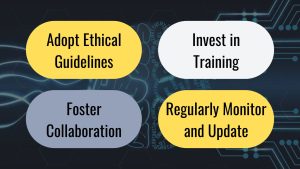content
AI development
January 15, 2025
6 min read
Introduction
The rapid development of artificial intelligence (AI) has transformed industries around the world. From healthcare to finance, AI is changing the way we work and live. However, this innovation comes with significant ethical challenges. Addressing these issues is crucial if AI development is to benefit society while minimising potential harm.
Understanding Ethical AI Development
Before diving into the specific challenges, it is important to understand what ethical AI development means. At its core, ethical AI focuses on creating systems that are fair, transparent, and accountable. Developers must consider the impact on society, user trust, and legal compliance. While this sounds simple, the reality is much more complex. AI systems often reflect the biases and shortcomings of their creators, leading to unintended consequences.

Key Ethical Challenges in AI Development
1. Bias and Fairness
Artificial intelligence systems are only as good as the data they are trained on. If the data contains biases, AI is likely to reproduce or even reinforce them. For example, hiring algorithms may favor one demographic over another because of historical biases in the data.
To address this problem, developers should actively seek out diverse data sets. They should also test systems for bias during and after development. Regular checks and updates can help maintain fairness as systems evolve.
2. Transparency and Explainability
Many AI systems operate as “black boxes.” Their decision-making processes are often opaque, even to their developers. A lack of transparency can lead to distrust, especially in critical areas like healthcare or law enforcement.
To mitigate this, teams must prioritise explanation. They need to design systems that clearly describe how decisions are made. Tools for visualising AI processes can help users and stakeholders understand the logic behind the results.
3. Privacy and Data Security
AI systems rely heavily on data, much of which is personal or sensitive. Mishandling this data can lead to breaches or misuse. Users can also feel violated if their data is used without proper consent.
Developers must implement robust security measures. They must also ensure that users understand how their data is being used. Implementing principles such as “privacy by design” can help maintain user trust.
4. Accountability
When AI systems fail, it can be difficult to determine accountability. For example, if an autonomous car causes an accident, who is responsible – the developer, the manufacturer, or the user?
To navigate this, organisations need clear policies. Establishing a system of accountability can help distribute responsibility fairly. In addition, developers should build in failsafes to minimise risk.

Strategies for Navigating Ethical Challenges
1. Adopt Ethical Guidelines
Many organisations and governments have developed AI ethics frameworks. Adopting these guidelines can provide a solid foundation for ethical development. For example, the European Union’s guidelines emphasize human control and data protection.
2. Foster Collaboration
Ethical AI development is not a stand-alone endeavor. It requires input from a variety of stakeholders, including ethicists, legal experts, and end users. By encouraging collaboration, teams can identify potential problems early and address them effectively.
3. Invest in Training
AI developers need ongoing education on ethics. Workshops, courses, and certifications can help teams stay up to date with best practices. Training also ensures that ethical considerations are embedded throughout the development process.
4. Regularly Monitor and Update
AI systems cannot be “set and forget.” Regular monitoring and updates are critical to addressing emerging ethical issues. Post-deployment audits can help identify and correct problems as they arise.

Future of Ethical AI
The ethical challenges in AI development are not static. As technology evolves, new dilemmas will emerge. Developers must remain adaptive and proactive. Organisations must create a culture of ethical responsibility, where every team member understands their role in creating responsible AI.
In the future, global collaboration will play a key role. Countries and organizations must work together to create universal standards. By doing so, they can ensure that AI remains a force for good abroad.
Conclusion
Overcoming ethical challenges in AI development is not an easy task. However, it is a responsibility that cannot be ignored. By addressing issues such as bias, transparency, privacy, and accountability, developers can create systems that are both innovative and ethical. With the right strategies and a commitment to continuous improvement, the AI industry can build a future that benefits everyone.
If you have any questions or an idea for a project, contact us via sales@instandart.com or fill out the form on the main page of the site to discuss. We are always ready to help!
